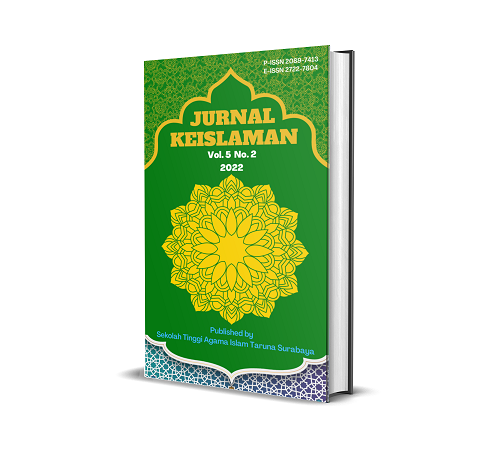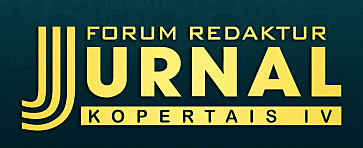RELEVANSI MODERASI BERAGAMA DI TENGAH MASYARAKAT MAJEMUK
Abstract
Tulisan ini bertujuan untuk menguraikan urgensi moderasi beragama di Indonesia dalam perpektif filsafat. Tidak bisa dipungkiri lagi bahwa Indonesia adalah bangsa yang unik “homogenous society†dan “religions†sekaligus. Tetapi ketika mengelola keberagaman, Indonesia justeru mengalami “anomali†dan “krisis†yang akut. Fenomena “pertarungan†dan “kompetisi†yang bersifat sosiologis baik dalam bentuk ekstrimisme, intoleransi, perundungan, radikalisme, ujaran kebencian, hingga pada level terorisme nyatanya menyeruak di berbagai daerah, dan acap kali mengganggu stabilitas kehidupan harmonis masyarakat di tanah air. Berdasarkan pada metode interpretasi, dengan merujuk pada berbagai literatur baik berupa buku, jurnal, artikel dan tulisan lepas lainnya yang relefan dengan topik bahasan, dapat di simpulka bahwa moderasi bergama di Indonesia sangat diperlukan dan bahkan mendesak untuk dilakukan sebagai upaya untuk membangun kehidupan bersama yang lebih harmonis. Spirit moderasi beragama seperti toleransi, keadilan, dan keseimbangan adalah prasyarat yang tidak bisa di tawar-tawar oleh siapapun, melainkan harus di junjung tinggi dalam mengelola realitas kehidupan masyarakat majemuk di tanah air.References
Abdullah, M. Amin, Multidisiplin, Interdisiplin & Transdisiplin: Metode Studi Agama & Studi Islam di Era Kontemporer (Yogyakarta: IB Pustaka, 2020)
_____________________, Moderasi Beragama dalam Konteks Indonesia Berkemajuan, Makalah disampaikan dalam seminar nasional, Majelis Tarjih dan Tajdid, Pimpinan Pusat Muhammadiyah, 5 Desember 2020
_____________________, Studi Agama Normativitas atau Historisitas (Yogyakarta: Pustaka Pelajar, 1996)
‘Abd al-Baqiy, Muhammad, Fuad, al-Mu’jam al-Mufahras li alfaz al-Qur’an al-Karim (Beirut: Dar al-Fikr, 1981)
Appleby, R. Scott, The Ambivalence of the Sacred: Religion, Violence and Reconciliation (Lanhan: Rowman and
Littlefield Publisher, Inc., 2000), hlm. 282; Erich J. Sharpe, Comparative Religion: A History (La Salle: Open Court, 1986)
Allport, W. Gordon, “Religion and Prejudice†dalam Personality and Social Encounter: Selected Essays (Boston: Beacon Press, 1960), hlm. 67-257
al-Ghazali, Imam, Ihya Ulumuddin, Jilid III
al-Attas, Syed, Muhammad, Naquib, On Justice and The Nature of Man: A Connebtarry on Surah al-Nisa (4):58 and Surah al-Mu’minun (23):12-14 (Kuala Lumpur: Menara Takaful Malaysia, 2015)
Arkoun, M., al-Islam: al-Akhlaq wa al-Siyasah, terj. Hashim Saleh (Beirut: Markaz al-inma’ al-qaumy, 1990)
____________, Tarikhiyyatu al-Fikri al-Araby al-Islamy (Bairut: Markat al-Inma al-Qaumy, 1986)
al-Qardhawi, Yusuf, Ghair al-Muslimin fii al-Mujtama’ Al-Islami (Qahirah: Maktabah Al-Wahbah, 1992)
Durkheim, Emile, De La Division Du Travail Social (Paris: Les Presses Universitaires de France, 1893)
el-Fadl, Khaled, Aboe, Speaking in God’s Name: Islamic Law, Authority and Women (Oxford: Oneworld Publications, 2001)
Feyerabend, Paul, Karl, Against Method: Outline of an Anarchistic Theory of Knowledge (Berkeley, 1987)
Habermas, Jurgen, Knowledge and Human Interest, terj. By. Jeremy J. Shapiro (Canada: Beacon Press, 1972)
Huntington, Samuel P., The Clash of Civilization and the Remaking of the World Order (New York: Library of
Congress Cataloging in Publication Data, 1996)
Ismail, Kerukunan Antarumat Beragama: Studi Ikatan Kewargaan dan Asosiasional pada Masyarakat Desa Pabuaran Kecematan Gunung Sindur Bogor, dalam Jurnal Penamas Vol. 34, No. 2, Juli-Desember 2021
James, William, The Varienties of Religions Experience: A Study in Human Nature (New York: New American Library, 1958)
Kamali, M. Hashim, dalam The Middle Path of Moderatioan in Islam: The Qur’anic Principle of Wasatiyah (Oxford: Oxford University Press, 2015)
Kuhn, S. Thomas, The Structure of Scientific Revolutions (London: University of Chicago Press, 1970)
Lakatos, Imre, “Falsification and the Methodology of Scientific Research Programmesâ€, Imre Lakatos, Imre, (ed.), Criticism and the Growth of Knowledge, (Cambridge: Cambridge University Press, 1974)
Marty, E. Martin, Cultural Foundations of Ethnonationalism: The Role of Religion, dalam W. A. Van Horne (ed.), Global Convulsions: Race, Ethnicity and Nationalism at the End of the Twentieth Century (Albany: State University of New York Press, 1997)
Mahmudin, dkk., Kohesi Sosial dan Keberagaman Agama: Studi Perbandingan Modal Sosial Sunda Wiwitan Kuningan dan Cimahi, Jawa Barat, dalam Jurnal Penamas, Vol. 34, No. 2, Juli-Desember 2021
Meijer, Roel, (ed.), Global Salafism: Islam’s New Religious Movement (New York: Oxford University Press, 2014)
Nasir, Moh., Metodologi Penelitian (Bogor: Ghalia Indonesia, 2009)
Oberg, Kalervo Culture Shock, Presented to the Women’s Clib of Rio de Janeiro, Brazil, Agustus 3, 1954
Osborn, Kevin, Tolerance (New York: The Rosen Publishing Group, 1993)
Popper R. Karl, The logic of scientific discovery (London: Routledge, 1992)
Rahman, Fazlur, Islam (Chicago: University of Chicago Press, 1979)
Saliba, Jamil, al-Mu’jam al-Falsafiy bi al-Faz al-Arabiyyah wa Inkliziyyah wa al-Latiniyyah, Jilid II (Beirut: Dar al-Saqafah, t.t.)
Subhi, Ahmad, Mahmud, al-Falsafah al-Akhlaqiyyah fi al-Fikr al-Islamiy (Mesir: Dar al-Ma’rifat, t.t.)
Soroush, Abdul Karim, “The Evolution and Devolution of Religious Knowledgeâ€, dalam Charles Kuzman (ed.),
Liberal Islam: A Sourcebook (New York: Oxford University Press, 1998)
The New International Webster Comprehensive Dictionary Of The English Language (Chicago : Trident Press International, 1996)
Walker, Sir. Rhomas, The Preaching of Islam: A History of Propagation of the Muslim Faith (New Delhi: Aryan Book International, 2002)
Wilkinson, Steven I., (ed.), Religious Politics and Communal Violence (New Delhi: Oxford University Press, 2005)
Copyright (c) 2022 Sufratman Sufratman

This work is licensed under a Creative Commons Attribution-ShareAlike 4.0 International License.
Authors who publish with this journal agree to the following terms:
- Authors retain copyright and grant the journal right of first publication with the work simultaneously licensed under a Creative Commons Attribution-ShareAlike that allows others to share the work with an acknowledgement of the work's authorship and initial publication in this journal.
- Authors are able to enter into separate, additional contractual arrangements for the non-exclusive distribution of the journal's published version of the work (e.g., post it to an institutional repository or publish it in a book), with an acknowledgement of its initial publication in this journal.
- Authors are permitted and encouraged to post their work online (e.g., in institutional repositories or on their website) prior to and during the submission process, as it can lead to productive exchanges, as well as earlier and greater citation of published work (See The Effect of Open Access).






















